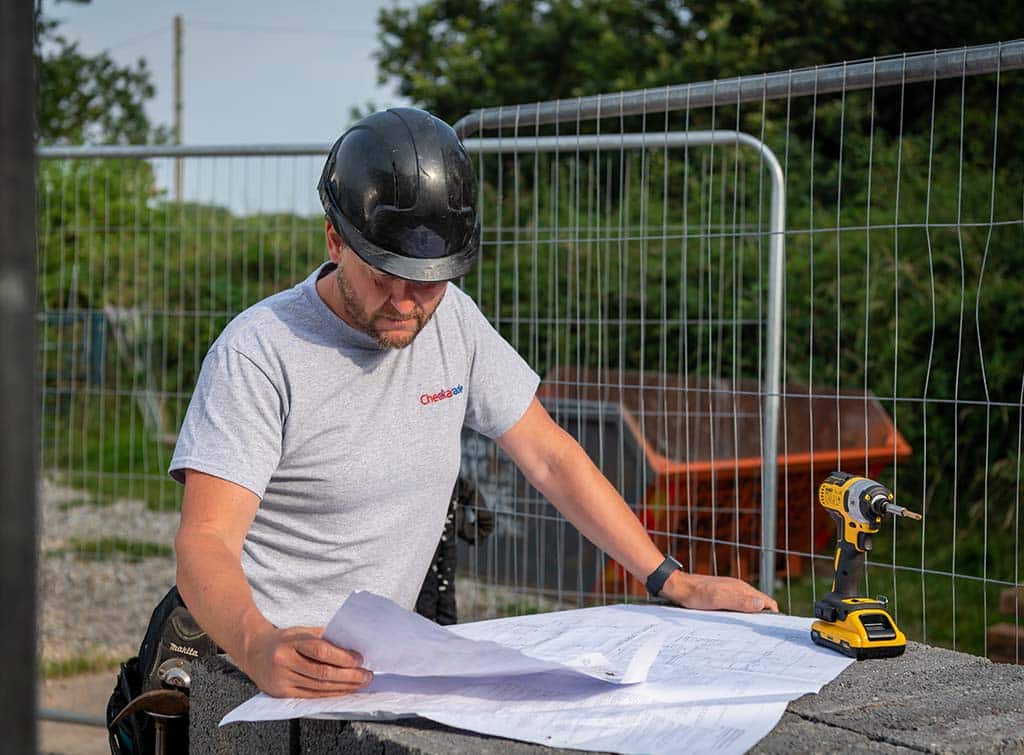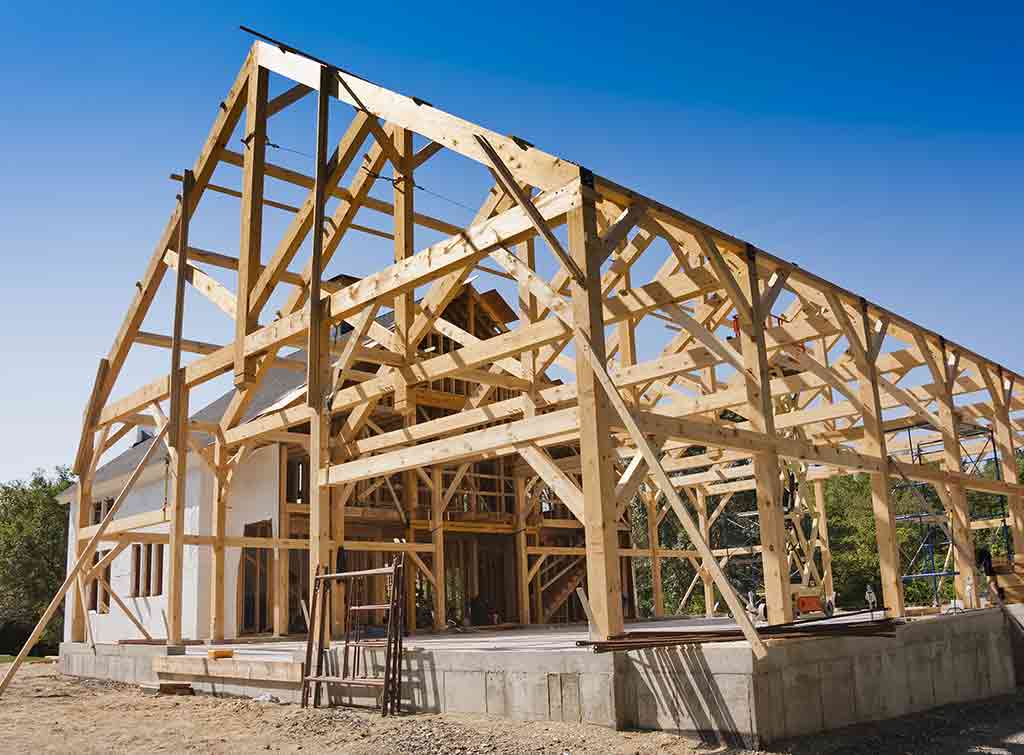How much do builders earn?

Builders are always one of the most popular tradespeople. In fact, in 2022 we had more than 4 million homeowners searching for local builders on Checkatrade.
With builders in such high demand, it’s helpful to understand how much you could earn – or how much you should pay your employees.
So, how much does the average builder earn? Keep reading to find out more.
How much does a builder make a year?
The average yearly earnings of a builder in the UK can range from around £11,000 per year for an apprentice, up to £57,000 per year for a business owner. But actual earnings for a builder will depend on your experience, skills, qualifications, the type of work, and where you live / work.
As a general rule, the more experienced you are as a builder, the more you can earn. And, if you’re self-employed or you start your own builder business then you can potentially earn a lot more.
Here are some average salaries for how much builders make a year in the UK:
| Level | Per hour | Per day | Per year | Business Costs* | Approximate Take Home Pay |
|---|---|---|---|---|---|
| Apprentice | £6.30 | £50 | £11,000 | 0 | £10,715 |
| Newly Qualified | £18.20 | £145 | £32,000 | 0 | £25,214 |
| Employed | £19.30 | £154 | £40,000 | 0 | £30,763 |
| Sole Trader | £38.00 | £304 | £56,000 | £7,006 | £37,589 |
| Business Owner (ltd company) | £38.50 | £308 | £57,000 | £9,946 | £37,508 |
| *includes estimated costs for business expenses such as vehicle, tools, insurance, fuel etc | |||||
How much money does a builder make per hour?
The average hourly rate for builders in the UK varies depending on experience and the type of employment arrangement you have. So, how much money does a builder make per hour?
Here’s a guide to the average builder hourly rates in the UK:
- Apprentice – £6.30 per hour
- Newly qualified – £18.20 per hour
- Employed – £19.30 per hour
- Sole trader – £38.00 per hour
- Business owner (Ltd company) – £38.50 per hour
How much does a builder earn a week?
The average weekly earnings of a builder will depend on their day rate, which can range from around £50 per day for an apprentice up to £308 per day for a business owner.
Here are some of the average figures for how much a builder earns a week, along with their average day rate:
- Apprentice – £50 per day / £252 per week
- Newly qualified – £145 per day / £727.6 per week
- Employed – £154 per day / £771.2 per week
- Sole trader – £304 per day / £1520 per week
- Business owner (Ltd company) – £308 per day / £1541.2 per week

How much money do builders make a month?
As we’ve mentioned, the exact amount of money that a builder makes a month will depend on experience, skills and where you live in the country.
Based on the salaries listed above, here are the average take-home figures for how much money builders make a month in the UK:
- Apprentice – £1091.92 per month
- Newly qualified – £3152.69 per month
- Employed – £3341.61 per month
- Sole trader – £6586.16 per month
- Business owner (Ltd company) – £6678.02 per month
How much does a builder apprentice or builder’s apprentice earn?
A builder’s labourer or apprentice will earn a starting salary of around £11,000 per year, while they learn the trade and build up skills and experience.
As a labourer or apprentice, you can expect your rate to be around £6.30 per hour, or £50 per day.
How much does a qualified builder earn?
As a qualified builder, how much you earn will depend on how long you’ve been qualified for – as well as any additional training, specialism or skills you’ve acquired.
To give you a guide, as a newly qualified builder, your salary would start somewhere in the region of £32,000 per year.
That equates to an hourly rate of around £18.20 per hour, and a day rate of roughly £145 per day.

How much can a self-employed builder make?
There’s no doubt that, as a builder, you can earn quite a bit more by being self-employed – and even more than that if you run your own building company.
Sole trader builder earnings
As a sole trader, you can expect to earn around £56,000 per year (before tax). However, as a sole trader, you need to factor in the business costs of running your business for things like your work vehicle, fuel, tools and builders’ insurance.
Average business costs for a sole trader builder in the UK are around £7,006 per year, which means your final take-home salary would be around £37,589 per year.
Become your own boss with your new builder business
You could get your business with the help of our ‘Become the Boss’ series.
You’ll get seven emails with actionable tips on starting your business. Each email features a fellow trade who was once in your position to give you advice.
You’ll also get a free business strategy call, and at the end of it all, you as the Founder of your new business. What’s not to love?
To get trade business insider secrets sent to your pocket, put your email address in the form below so we can help you to get started.
How profitable are building companies?
If you run your own business as a builder, you have a higher earning potential – with an average turnover around £57,000 per year.
However, turnover isn’t necessarily what you should be focusing on. It’s actually profitability that’s important.
As a business owner you need to factor in the costs of running your business (vehicle, fuel, tools, materials, insurance, etc), which is estimated at around £9,946 per year for a limited company.
That equates to an average take home salary for you as a builder business owner of around £37,508 per year.
The reality is that, with the dramatic rise in running costs, your profitability could be much lower if you’re not carefully planning and pricing your jobs.
It’s important to work out how much a job will cost you before quoting, so you can make a decent profit. But this means more than just accounting for materials. You also need to think about staff pay and expert help, such as the average salary for a building surveyor, whose skills may be needed on your project.
You might want to check out some of our cost guides for the popular jobs you might be taking on:
- House extension costs
- Loft conversion costs
- Garage conversion costs
- Cost to build a house
- Cost of renovating a house

How to make your builder business more profitable
Building (pun intended!) your new business should make you feel excited, proud and have a sense of achievement.
If you’re not making much profit, there’s something not quite right.
Tips to help boost your turnover and make your builder business more profitable
Make sure you’re charging enough to cover your expenditure
Your expenditure includes tools, materials, insurance, marketing, wages, fuel, and anything else used on any job. If not, you may need to raise your prices.
Need help with quoting? Here’s what to include on a builder’s quote.
Choose to specialise in areas that are the most profitable
Some builder jobs make more money with less spending on your part (for tools and materials, for example).
Consider how large the area you cover should be
Travelling further afield will eat into your profits through vehicle and fuel costs. So, if possible, stick to your local area or charge extra for jobs that are further away.
If you’re travelling further, you need to make sure it makes sense to do this. Either the job value is worth it, or you charge for all of the travel to and from the job for the duration of the project.

Minimise your outgoings
Try to have no or as little debt as possible. Remember, interest on credit cards or loans can impact your vital profits.
Make sure you shop around for the best value tools, equipment, materials and workwear too.
Did you know, you can get exclusive deals for tools, materials, business insurance and workwear as a Checkatrade member?
Focus on getting visibility for your business
This can be through advertising, your website, your company brand, customer reviews, SEO or industry contacts who can send work your way.
Marketing is essential to growing your business.
Focus on providing the best customer experience
By providing an excellent service to all your customers, you’ll quickly build a strong reputation, win more work through word of mouth, and gain positive customer reviews.
Why not also join a trade directory like Checkatrade to build your reviews and online reputation?
Save money on business insurance as a Checkatrade member
We’ve partnered with insurance specialists to offer you an exclusive discount.
As a Checkatrade member, save 20% off public liability insurance.
To claim, head over to the offers and discounts section of our Members’ Area.
Grow your business with the #1 trade directory
Over 4 million customers search for builder services on Checkatrade every year. Make sure you're one of the businesses they find!
Find out more


No comments yet!